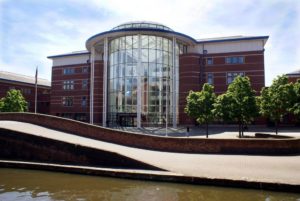
Notttingham crime solicitor Graham Heathcote recently represented two clients from the Nottingham Polish community who were charged with similar allegations of disorderly conduct, and one with two allegations of police assault.
Although both were convicted of the public order offence, there were not guilty verdicts for the police assault allegations.
Neither client had been in trouble with the police before. They decided, along with others, to stage an impromptu, unlicensed, boxing match in the street in the Forest Fields area of Nottingham. Unfortunately it all gets out of hand to the extent that a member of the public calls the police.
Three police cars attended the incident. One of the group, represented by another firm of solicitors, was arrested. The police wanted to arrest Graham’s client. The decision to arrest was based on the description of one of those involved. This was given by the eye-witness who called the police.
The police witnesses alleged that Graham’s client backed off and gestured as if he wanted to fight the police. It was then alleged that our client grabbed a female officer in a headlock, taking her to the ground. On the way to the floor it was claimed that he kicked a second officer.
The third Polish male was arrested for the public order offence based on the witness account, and he was initially represented by Nick Walsh of VHS Fletchers.
Graham’s client pleaded not guilty to all of his charges. Nick’s client pleaded not guilty to the public order offence. Unfortunately, legal aid was refused for Nick’s client despite his good character and the challenge to police evidence. This is because the charge did not carry a prison sentence.
Legal aid was also initially refused for Graham’s client on the basis of his financial means. Graham pursued a hardship application with the Legal Aid Agency and legal aid was eventually granted to ensure his free representation before the court.
Pro Bono Representation
Unfortunately, the hardship application was not decided until two days before the trial. As a result, little time was left for preparation. Graham felt able, however, to represent the second client without legal aid on a pro-bono, or free, basis to ensure that he had a fair trial. As a result, this client did not have to pay for his representation.
Decisive evidence from cameras
CCTV footage was obtained from the street. Unfortunately the incident was in the distance. It was grainy and not helped by poor lighting. It did not appear to show a great deal of the incident.
Graham took the time to slow the footage down and was able to blow up the footage. If watched frame by frame the camera captured the police jumping on Graham’s client. They then took him to the floor before the incident disappeared from view behind a police car.
This footage alone cast doubt on the truth of the police allegation that Graham’s client was the aggressor and put an officer in a headlock. He would also have seemed to be too far away from other officers to kick any of them.
Graham’s second client had continued to film the incident on his mobile phone once it had gone out of view of the street CCTV. Although the police denied it, one of them was seen on the CCTV taking our client’s phone off him and then returning it. Our client maintained the officer deleted the footage.
Graphic footage retrieved from mobile phone

The footage was able to be retrieved from the phone despite the police attempts to delete it. It showed the confiscating officer slamming our client’s head on the pavement. The footage was so graphic that the court usher was heard to gasp when it was played.
Of course, in part the prosecution case was dependent upon the truthfulness of this officer. This was the same officer who denied the confiscation of the phone and assaulting the client. This evidence was proved to be untrue.
The only type of camera footage missing was police BodyCam footage. Although six police officers in total attended and body cameras are now issued as standard to all front line officers apparently not a single officer was wearing one.
Not guilty of police assault
Although both clients were convicted of the disorderly conduct mater relating to their earlier behaviour, the client charged with police assault was found not guilty of both offences.
Contact a criminal solicitor in Nottingham
With the right representation (in this case free for one client) and preparation (even at short notice) police evidence can be successfully challenged. Here, if convicted, one of our clients was likely to be receive a prison sentence.
Choosing the right criminal lawyer who will properly prepare and present your can make the difference between guilty or not guilty verdicts.
If you are being investigated by the police or face court proceedings then Nottingham criminal defence lawyer Graham Heathcote can be contacted on 0115 9599550 or email him here.

